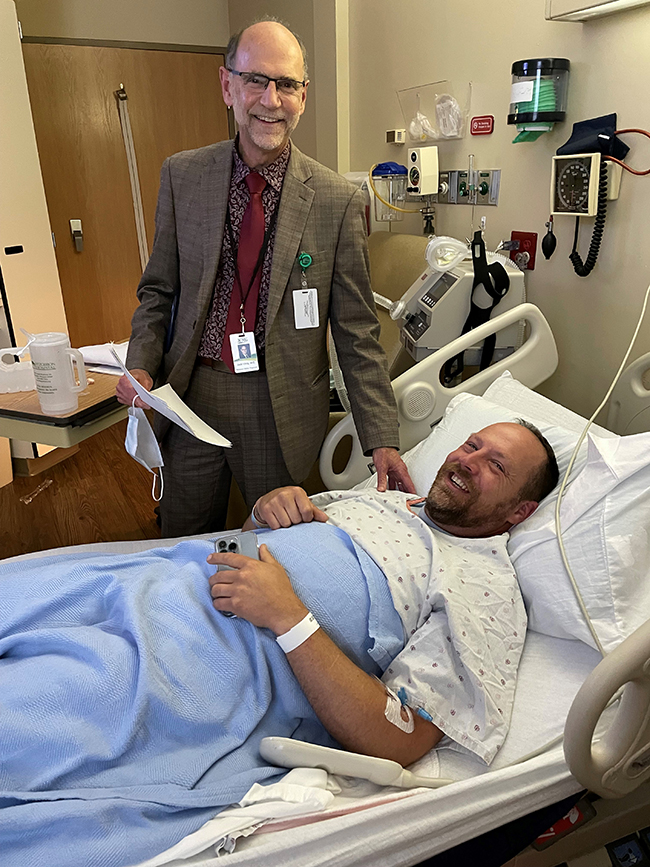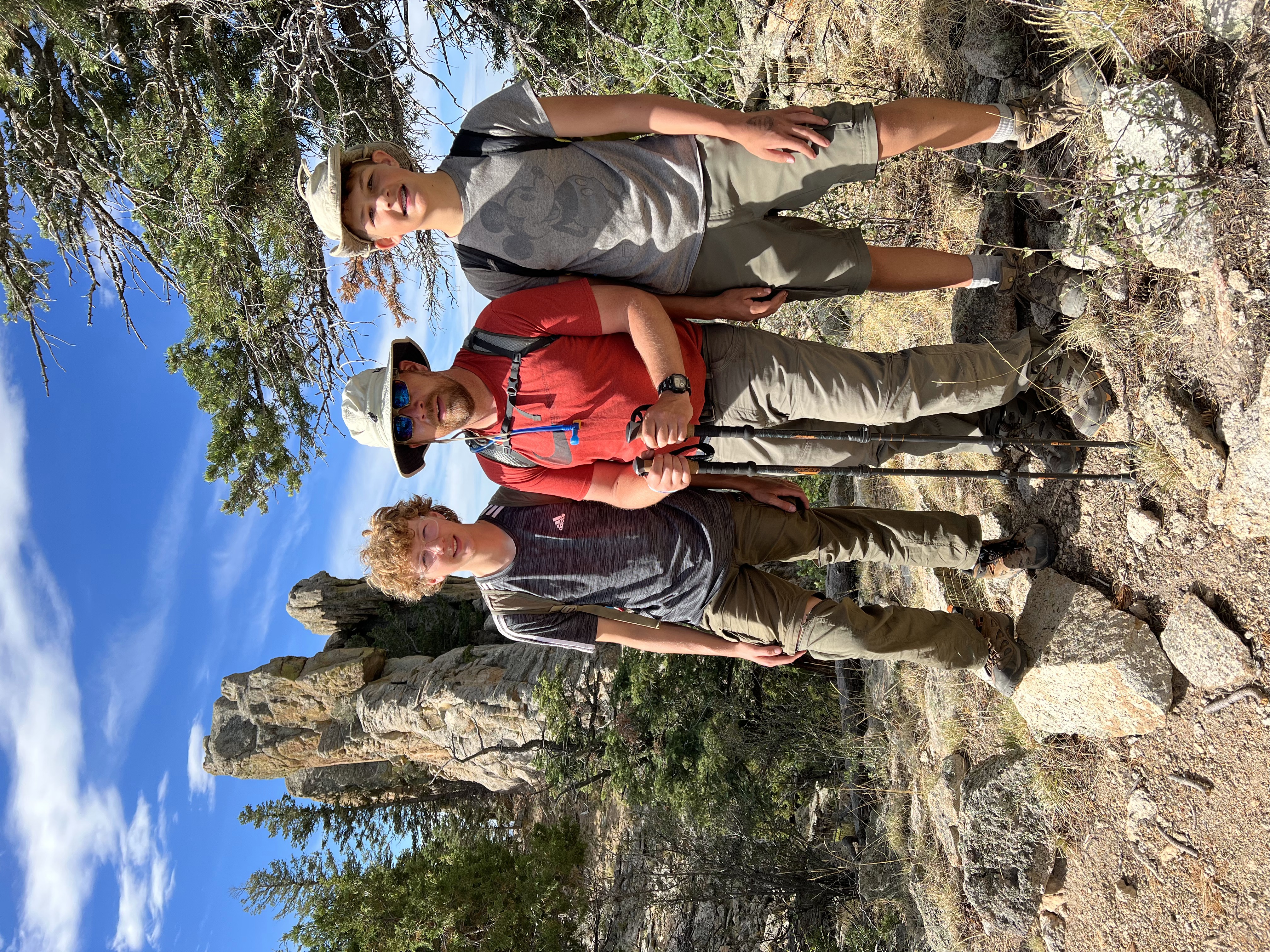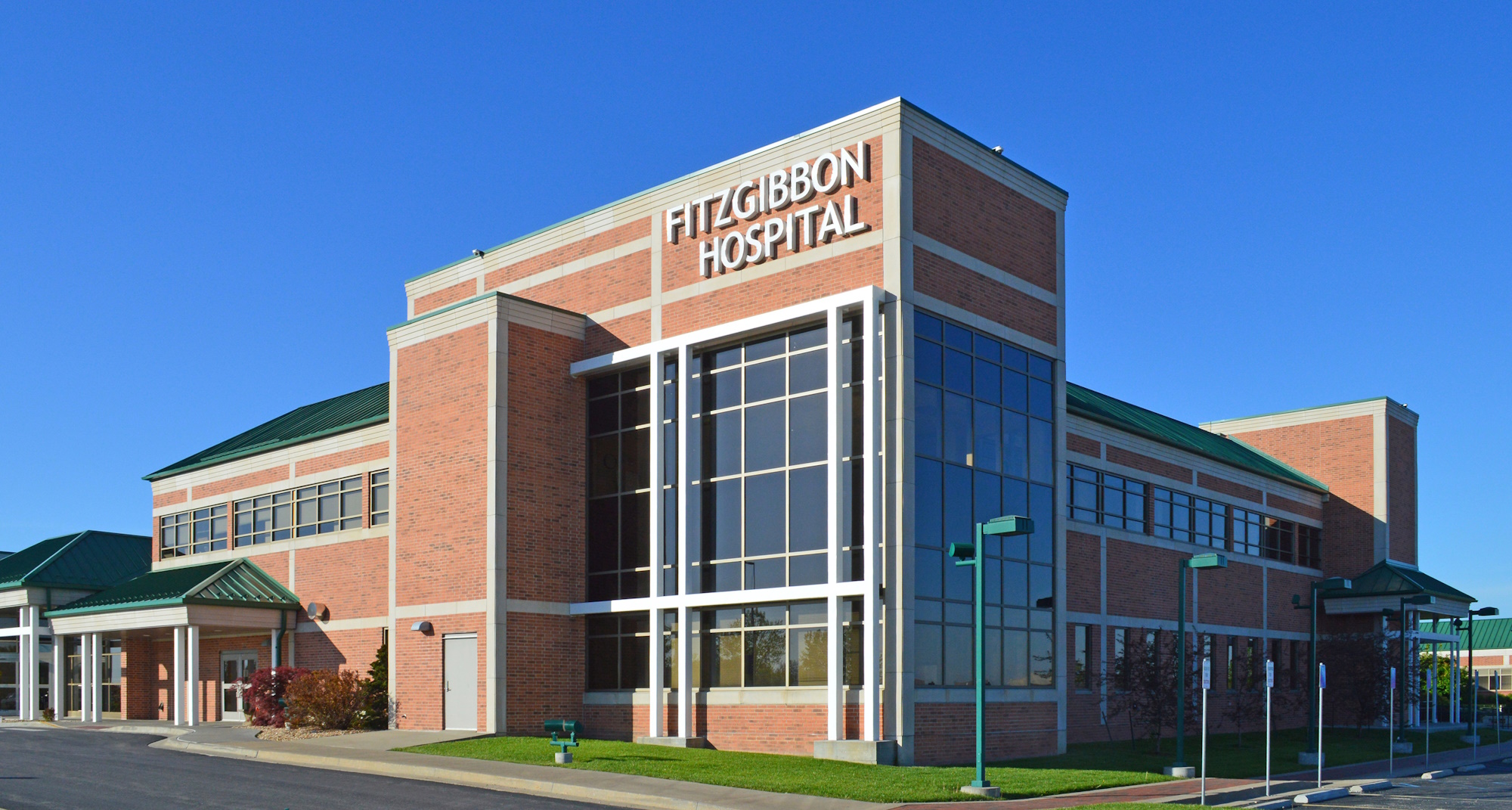Boy Scout activities adviser recounts personal experience in train derailment
July 01, 2022

“You could hear it…the train had smashed into something. But it didn’t stop immediately,” recounted Jonathan Awe, one of the 275 passengers on the Amtrak train that derailed on Monday near Mendon as it was enroute from Los Angeles to Chicago.
Awe was still hospitalized Thursday morning, June 30, at Fitzgibbon Hospital in Marshall and was one of 11 patients brought to Fitzgibbon for treatment.
An Appleton, Wisc., schoolteacher and activities adviser for Boy Scout Troop 73, Awe was in the caboose of the train with other members of the troop – including his two teenage sons – returning from a trip to legendary Philmont Scout Ranch in New Mexico.
“I was reading a book, and I looked out the window. You could see debris and grass flying up beside us – just going everywhere,” described Awe. “We were on the left side of the train. And when it started to roll, I reached down to grab my phone and then I just went flying - slammed into the chairs across the aisle and maybe into the overhead luggage compartment….I really don’t know. I realized the car had flipped, and I thought I had punctured a lung, because I couldn’t breathe. When the train stopped, I really couldn’t move. I knew I was hurt, but I didn’t know how bad.”
As he recalled the accident scene while lying in his hospital bed at Fitzgibbon, he raised his hands and motioned above his head. His eyes moved rapidly back and forth as he relived those terrifying moments, realizing that for a few minutes he had no idea if his boys had made it through the wreck alive.
“I then could hear my oldest son Elijah and his voice,” said Awe, the tone of his voice rising as he fought back tears from a memory so raw and so fresh. “And I called out to him and asked him to try to find his brother.”
Younger brother Isaiah, age 14, and Elijah, age 16, had prepared for two years for the trip to Philmont. Their dad said, “They were so excited to ride on a train. But after what happened, I don’t know if they’ll ever want to get on one again.”
After the cars came to rest, leaders from the Boy Scout troop immediately began triaging other people inside the caboose and trying to calm them down, according to Awe. Some were writing passengers’ names and birthdates on their forearms for emergency personnel to see when they arrived.
Awe, who suffered three fractured vertebrae, must have had a phrase from the Boy Scout Oath in mind immediately after the crash, “to help other people at all times.” Re-assuming his role as the Boy Scout troop’s activities adviser during the trip, he began sending texts to a group of parents letting them know they had been in a train wreck.
“I kind of drug myself to the back of the train to get out of the way,” said Awe, adding that a fellow troop leader, Dr. Sanjay Chopra, an ER physician back in Wisconsin, was screaming on the floor.
“He has broken ribs, bruised lungs and possibly a broken wrist. And a woman, I think her name was Aurora, wound up completely in the overhead luggage bin. Another woman – I don’t know her name – was in her 70s; she was moaning. She was hurt pretty bad. There were lots of people who were a lot worse off,” said Awe.
Awe said after he was carried out of the caboose on a backboard, he was laid across the rails, and he could see more of the Boy Scout troops helping other people. Again, to ensure the parents back in Wisconsin knew their sons were okay, he asked each boy to come to him so he could text their parent or have them call home.
Luckily, according to Marshall physician Jack Uhrig, M.D., Awe is not expected to experience any paralysis and will likely not require surgery for his injuries. Awe is planning to see a spine specialist upon his return home and was expected to be discharged in a specially fitted back brace.
Uhrig developed a special “Boy Scout bond” with Awe as he was evaluating him after his admission to Fitzgibbon.
“I was trying to obtain some information and get a feel for what had happened. Knowing he had been to Philmont and hiking in the mountains just days before, and now he was in such pain. He’s got something really wrong,” said Uhrig. “Having been a scoutmaster myself, even for a very brief time, and having been to Philmont with my own dad, I can relate.”
After the initial evaluation on Monday night, Uhrig brought some of his own old Boy Scout badges to Awe the next morning and asked him to share them with troop members as recognition of their courage through the ordeal.
“I’m glad you’re doing well,” said Uhrig, smiling as he reached down to shake Awe’s hand.
After suggesting that it appeared Awe seemed to always be helping others – even in the midst of the chaos of the disaster – he again fought back tears.
“I just know what it was like….even for those few minutes….when I didn’t know that my kids were OK. And I just wanted to let all the other parents know,” he said.
Awe was brought to Fitzgibbon Hospital along with another injured passenger in the same ambulance, while his boys were taken with other members of Troop 73 to a school in Columbia until arrangements could be made for their trips home.
As of Tuesday evening, Awe said all members of the Troop 73 were either home or on their way, with the exception of himself and Dr. Chopra. He also wanted to give special thanks to Tonya Ford and Johanna Cox, moms from Troop 6 in Columbia, who provided snacks and drinks for the Wisconsin troop’s journey home.
When asked what he might have learned from the experience, Awe didn’t hesitate to respond.
“Just how amazing people can be. People rise to the challenges…and how compassionate people can be: people here in this area. People were pulling ladders out of their backyards to help get people out of the train. I’m humbled by the compassion and humanity, because you just don’t see enough of that.”
As for Awe, he said the Fitzgibbon doctors and nurses had taken good care of him, and the staff had been very kind and accommodating. He kept repeating that his outcome could have been much worse.
“I’ve got my boys, and we are a bit battered and bruised. But it could’ve been a lot worse,” he repeated.
He added that he could see that his boys and members of the troop had “applied what they learned” as Boy Scouts.
“I know those boys were tired – after backpacking at camp. And you don’t get much sleep on the train. But they did their best to apply what they’d learned and to help others in need,” said Awe. “It was a pretty beautiful thing to see.”



